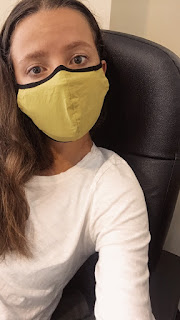How My Eating Disorder Impacted My Relationships
During
one of my first group sessions in treatment for my eating disorder, the counselor
asked us how our eating disorders impacted our relationships. I remember immediately
thinking how my eating disorder affected me in physical, romantic relationships.
My stomach lurched as memories came flooding back of a hand curling around my
bicep, pointer finger to pinky. The words, “You’re so fucking tiny” echoed in
my mind.
Each one of us wrote down our
thoughts on a piece of paper and placed them in a jar. The counselor read each
of our thoughts and censored the possibly triggering ones.
To my surprise most people discussed
how their eating disorder affected their relationships with their friends and
family. I felt embarrassed and a little ashamed that I had not thought of my own
friends and family.
I guess that was the whole point
of the exercise- to have us think outside our eating disorders in how they affect
us and more closely examine how our eating disorders affect our friends and
families.
To my knowledge, most people around
me and even many of my friends were unaware that I had an eating disorder at
the time that I was suffering. (I only assume this because when I did come clean
about my eating disorder, friends and family were shocked. Some felt betrayed
that I had kept something so big from them.)
Although friends and family could
not see my eating disorder, they could see my pain. They watched me race
with tears in my eyes and a limp in my step through injury after injury after
injury.
I
called it willpower, discipline, determination.
They
called it what it was: stubbornness and stupidity.
They saw my eyes glaze over before
races as I became overwhelmed by a familiar wave of pre-race anxiety. In these
moments, I became unreachable, every thought was swallowed by distress. My mom
would attempt to quell my anxiety by hyping me up before races, reassuring me I
would not forget how to run, that although I felt too tired to move, as soon as
the race started, adrenaline would take over.
My
mom also attempted to reassure me after the bad races- the ones where I would
cry silently because I felt too slow or too fat.
I
knew it pained her to see me cry repeatedly over races and in frustration over my unshakeable injuries.
She was convinced running was not good for me- that it was tearing me apart.
I
recall vehemently disagreeing.
However,
in hindsight, I think she was right.
My
eating disorder was a monster that mercilessly clawed at me. That monster convinced
me I wanted nothing more in life than to be thin and fast. My ed had no
patience for anyone or anything that stood in my way of achieving these goals. Concerned
people like my mom, my persistent injuries, and bad races, aggravated my eating
disorder. My ed voice would ring louder than ever in my ears, demanding me to
isolate from concerned family and friends, to exercise in any way I could, to
start running earlier and longer than I should after injuries, and to eat
minimally no matter my hunger level.
I began to lie about my food and
exercise habits. I lied about working out- I would say I was at the gym for
less time than I really was- that I got caught up talking to a friend. I lied
about how many times I would run a day- or claim that the mileage was necessary
because I was a cross country runner.
I lied about taking laxatives.
My eating disorder made a liar out
of me.
I continued to also lie to my friends about how
often I would run and work out. If I were unexpectedly invited out to ice cream
or a meal, I would not go. Anxiety over gaining weight over unplanned calories
in my day made me cancel far too many plans. Because of my ed, I missed out on so
much more than just food; I missed out on so many memories.
In late high school and early college,
at the height of my ed, I did have a select few, close friends that knew
about my eating disorder. I only allowed them this knowledge because they
either figured it out on their own, or because, they themselves also struggled
with an ed.
It was these friends that got me
through my first couple years of college. The unspoken knowledge in sharing the
same struggled bonded us; it kept us close. (It is not the only thing
that kept us close- however, I believe that there is a uniquely powerful bond
between people sharing the same secret sicknesses.)
Sometimes
I look back on those years and wonder how healthy these relationships really were.
I cannot help but speculate if my eating disorder was insidiously feeding
theirs, and if their eating disorders were insidiously feeding mine.
In
these friendships, we would fall and catch each other after bursts of indulgences
of ed behaviors. We would cry and laugh, starve, and run, and eat copious amounts
of pizza and cookie dough. We endlessly compared our bodies to the others’. Secretly,
or not so secretly, both of us wished we were as thin as the other. I remain
friends with some of these people. However, some degree of separation was
required to maintain the friendship. We had to go through the ugly parts of
recovery on our own so that we could truly recover.
Some
of these friendships ended after the degree of separation. (In these instances,
I cannot help but wonder that perhaps our eating disorders were the only thing
that bound us together.)
There
was one friendship I had where neither of us knew the other was silently suffering
from the same sickness. (It was not until years after the friendship ended where
we found out the other was struggling.)
We
spent seemingly every waking moment together talking and laughing- and- we
never ate. Looking back, I think we justified not eating because the other person
never brought it up. The closest we came to talking about eating was when we talked
about our love of not eating. We shared the same feeling of euphoria
when we had an empty stomach. We felt crystal clear- laser focused.
This
was the first time I talked openly about aspects of my eating disorder that I secretly
loved. If I told anyone else, they would have been worried. This friend was
never worried. They agreed with me. Because of this, I felt like I could take
on the world with this person. We could be skinny and powerful and beautiful together.
Unknowingly,
we were making each other sicker.
One day, this friend did not want to be friends with me anymore. I did not understand why and I was devastated and heartbroken. However, years later, after learning that both of us were suffering from an eating disorder at the time of our friendship, I know that neither of us were going to get better until the friendship ended. Perhaps this heartbreak was a blessing in disguise.
It is this specific heartbreak that has taught me that it is okay that I have lost some friends through recovery. Sometimes, you must lose friends to not lose yourself. And that is okay. I know I have other friends and family who love and support me.
And you do too.
Remember,
you are not alone. There are so many people rooting for you even if you are not
rooting for yourself.
With
love,
Emily



Comments
Post a Comment